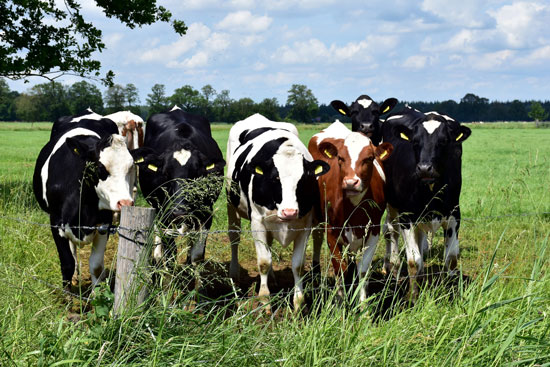

Livestock farming, particularly cattle production, plays a significant role in global food security and economies. However, it also contributes to greenhouse gas emissions and environmental challenges. To address these concerns, farmers are increasingly adopting sustainable practices to improve efficiency, reduce resource consumption, and earn carbon credits. This article explores strategies for efficient cattle management that not only enhance the feed-to-milk production ratio but also contribute to earning carbon credits and reducing the environmental footprint.

Tailoring cattle diets to meet specific nutritional requirements enhances feed efficiency and reduces waste. Incorporating balanced forages, grains, and feed additives optimizes nutrient intake.
Utilizing highly digestible feed sources and additives that enhance digestion maximizes nutrient absorption and minimizes waste production.
Implementing precision feeding techniques, aided by advanced technologies, customizes diets based on individual cow needs, improving efficiency.
Investing in high-quality forage production and preservation reduces the need for concentrate feeds and lowers resource usage.
Maintaining optimal cow health and minimizing stress factors improve feed intake and milk production efficiency. Health monitoring and disease prevention contribute to overall efficiency.
Selecting and breeding dairy cattle for improved feed efficiency and higher milk production per unit of feed consumed enhances long-term sustainability.
Balanced diets and feed additives not only enhance feed efficiency but also reduce methane emissions from enteric fermentation.
Efficient manure practices, like composting and anaerobic digestion, decrease methane emissions from manure decomposition and provide nutrient-rich fertilizers for crops.
Rotational grazing and managed grazing practices sequester carbon in the soil, reducing emissions and promoting sustainable land use.
Breeding for traits like feed efficiency and methane reduction potential can lower emissions per unit of output.
Incorporating renewable energy sources and optimizing energy usage in facilities, equipment, and transportation reduces the carbon footprint.
Sustainable land management practices enhance soil health, sequester carbon, and mitigate degradation.
Utilizing advanced technologies for methane capture and precision agriculture aids in emissions reduction and carbon sequestration.
Sustainable livestock management is a critical component of addressing environmental concerns associated with cattle production. By combining strategies to improve the feed-to-milk production ratio with measures to reduce the carbon footprint, farmers can enhance their operational efficiency while earning carbon credits. The dual approach benefits both the environment and the bottom line, ensuring a more sustainable and responsible future for livestock farming. As the agricultural industry continues to evolve, embracing these practices can lead to a healthier planet and more resilient farming systems.
